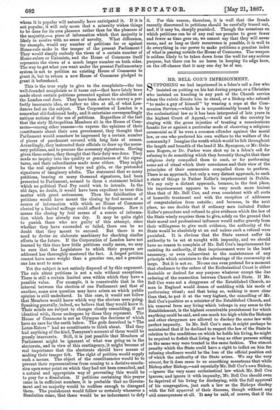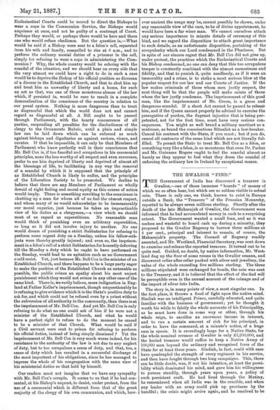MR. BELL COX'S IMPRISONMENT.
SUPPOSING we had imprisoned in a felon's cell a Jew who insisted on putting on his hat during prayer, or a Christian who insisted on kneeling in any part of the Church service where the rubric directs him to stand, or a Bishop who refused " to make a guy of himself " by wearing a cope at the Com- munion Service,—which he is unquestionably bound to do by the ecclesiastical law as it has been interpreted of late years in the highest Court of Appeal,—would not all the country be ringing with the gross injustice of treating a conscientious fanatic for or against a particular mode of observing a religions ceremonial as if he were a common offender against the moral law, or one who preferred his own welfare to the welfare of the community? Imagine the wrath which would be felt throughout the length and breadth of the land if Mr. Spurgeon, or Mr. Guin- ness Rogers, or Dr. Parker were shut up in a felon's cell for refusing to do something which they honestly thought that their religious duty compelled them to omit, or for performing some act of ritual which their conscience and their view of the principles of their communion compelled them to perform. There is an approach, but only a very distant approach, to such a state of things in Father Keller's imprisonment in Dublin. We say only a distant approach, because, in the first place, his imprisonment appears to be very much more lenient than that of Mr. Bell Cox, and even consistent with all sorts of honorific treatment and with the reception of addresses of congratulation from outside ; and because, in the next place, no one doubts that if ordinary men imitated Father Keller's procedure and refused to give evidence which the law of the State wisely requires them to give, solely on the ground that their moral and professional influence would stiffer gravely from their willingness to give such evidence, the authority of the State would be absolutely at an end unless such a refusal were punished. It is obvious that the State cannot suffer its authority to be set at naught with impunity, and we should have no reason to complain of Mr. Bell Cox's imprisonment for resisting its authority, if that imprisonment were in the least necessary, or even subservient to the maintenance of any principle which ministers to the advantage of the community at large. But it is not so. No one can even pretend for a moment that obedience to the orders of the Ecclesiastical Court is either desirable or desired. for any purpose whatever except the due ordering of the connection between Church and State. If Mr. Bell Cox were not a clergyman of the Established Church, no man in England would dream of meddling with his mode of performing ritual; and that being so, nothing is more clear than that, to put it at the very highest, the cancelling of Mr. Bell Cox's position as a minister of the Established Church, and hie removal from any living which belongs in any sense to the Establishment, is the highest conceivable punishment for which anything could be said, and one much too high while the Bishops and other clergymen are allowed to disobey the same law with perfect impunity. In Mr. Bell Cox's case, it might perhaps be maintained that if he declined to respect the law of the State in relation to the conditions on which he holds his living, he might be required to forfeit that living so long as other persons acting in the same way were treated in the same fashion. The utmost penalty which the State could have a right to inflict on him for refusing obedience would be the loss of the official position out of which the authority of the State arises. We say the very utmost, for it does seem to us something monstrous that while Bishop after Bishop,—and especially Mr. Bell Cox's own Bishop, —ignore the very same ecclesiastical law which Mr. Bell Cox ignores; and ignore it with impunity, Mr. Bell Oox should even be deprived of his living for disobeying, with the full approval of his congregation, just each a law as the Bishops disobey with the fall approval of their dioceses, though without any evil consequences at all. It may be said, of course, that if the Ecclesiastical Courts could be moved to direct the Bishops to wear a cope in the Communion Service, the Bishops would acquiesce at once, and not be guilty of a contempt of Court. Perhaps they would, or perhaps there would be here and there one who would refuse obedience. But the question ie,—What would be said if a Bishop were sent to a felon's cell, separated from his wife and family, compelled to rise at 6 a.m., and to perform the ordinary menial duties of a prisoner in the cell, simply for refusing to wear a cope in administering the Com- munion? Why, the whole country would be echoing with the scandal of the situation, and we should bear on every side that the very utmost we could have a right to do in such a case would be to deprive the Bishop of his official position as diocesan of a diocese in the Established Church, and that.to shut him.up and treat him as unworthy of liberty and a home, for such an act as that, was one of those monstrous abuses of the law which, if persisted in, would be sure to result in a complete demoralisation of the conscience of the country in relation to our penal system. Nothing is more dangerous than to treat as disgraceful that which the world does not and cannot regard as disgraceful at all. A Bill ought to be passed through Parliament, with the hearty concurrence of all parties, suspending all penalties for the disobedience of the clergy to the Ornaments Rubric, until a plain and simple law can be laid down which can be enforced as much against bishops and dignitaries as against rectors, vicars, and curates. If that be impossible, it can only be that Members of Parliament who know perfectly well in their consciences that Mr. Bell Cox is, if too fanciful and scrupulous in his ceremonial principles, none the less worthy of all respect and even reverence, prefer to see him deprived of liberty and deprived of almost all the blessings of life, to facilitating in any way the removal of a scandal by which it is supposed that the principle of an Established Church is likely to suffer, and the principles of the Liberation Society to be promoted. We decline to believe that there are any Members of Parliament so wholly devoid of right feeling and moral equity as this course of action would imply. There is something revolting to the conscience in shutting up a man for whom all of us feel the utmost respect, and whom many of us would acknowledge to be immeasurably our moral superior, just because he takes an impracticable view of his duties as a clergyman,—a view which we should most of us regard as superstitious. No reasonable man would think of punishing even an arbitrary superstition, so long as it did not involve injury to another. No one would dream of punishing a strict Sabbatarian for refusing to perform some urgent duty on a Sunday, unless his fellow-sub- jects were thereby greatly injured ; and even so, the imprison- ment in a felon's cell of a strict Sabbatarian for honestly deferring till the Monday a duty which he ought to have performed on the Sunday, would lead to an agitation such as no Government could resist. Yet, just because Mr. Bell Cox is the minister of an Established Church, and there happens to be a large party eager to make the position of the Established Church as untenable as possible, the public evince an apathy about his most unjust punishment which they would not evince in any other case of the same kind. There is, we verily believe, more indignation in Eng- land at Father Neller's imprisonment, though unquestionably he is refusing to give evidence which it is the State's positive duty to ask for, and which could not be refused even by a priest without the subversion of all authority in the community, than there is at the imprisonment of Mr. Bell Cox. And yet Mr. Bell Cox is only refusing to do what no one could ask of him if he were not a minister of the Established Church, and what he would have a perfect right to refuse to do the moment he ceased to be a minister of that Church. What would be said if a Civil servant were sent to prison for refusing to perform his official duties, instead of being simply dismissed ? Yet the imprisonment of Mr. Bell Cox is very much worse indeed, for his resistance to the authority of the law ie not due to any neglect of duty, but to too scrupulous a sense of duty, and that, too, a sense of duty which has resulted in a successful discharge of the most important of his obligations, since he has managed to impress the whole of his congregation with the same view of his ministerial duties as that held by himself.
Our readers must not imagine that we have any sympathy with Mr. Bell Cox's scruple. It seems to us that if he had con- sented, at his Bishop's request, to desist, under protest, from the use of a ceremonial which is different from that of the great majority of the clergy of his own communion, and which, how- ever ancient the usage may be, cannot possibly be shown, under any reasonable view of the ease, to be of divine appointment, he would have been a far wiser man. We cannot ourselves attach any serious importance to minute details of ceremony of this kind, and we regard the disposition to attach great importance to such details, as an unfortunate disposition, partaking of the scrupulosity which our Lord condemned in the Pharisees. But in spite of our sincere regret that Mr. Bell Cox did not give under protest, the practices which the Ecclesiastical Courts and his Bishop condemned, no one can deny that this too scrupulous temper is constantly combined with the utmost earnestness and fidelity, and that to punish it, quite needlessly, as if it were an immorality and a crime, is to strike almost serious blow at the popular respect for our law and our Courts of Instil*. If the law makes criminals of those whom men justly respect, the next thing will be that the people will make saints of those whom the law justly condemns. The imprisonment of this good man, like the imprisonment of Mr. Green, is a gross and dangerous scandal. If a short Act cannot be passed to ram* him, and if the Queen cannot properly be advised to exercise the prerogative of pardon, the flagrant injustice that ie being per- petrated, not for the first time, must have very serious con- sequences. You might as well brand a military martinet as a mutineer, as brand the conscientious Ritualist as a law-breaker. Cancel his contract with the State, if you must ; but if you do, cancel all contracts of the same kind which are not literally ful- filled. To permit the State to treat Mr. Bell Cox as a felon, or something very like a felon, is so monstrous that even Dr. Parker and Mr. Guinness Rogers ought to feel the scandal almost as keenly as they appear to feel what they deem the scandal of enforcing the ordinary law in Ireland by exceptional means.



















































 Previous page
Previous page